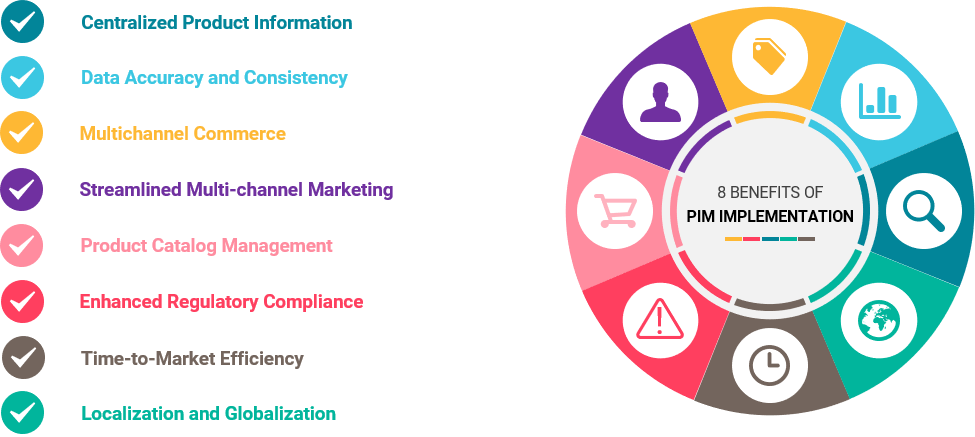
Table of Contents
Why do manufacturers need PIM?
In the fast-paced world of manufacturing, managing product information efficiently is crucial for success. Product Information Management (PIM) systems have emerged as a powerful tool for manufacturers to optimize their business and achieve greater efficiency. A PIM system acts as the foundation for managing and distributing product information across various channels.
This article will explore the importance of accurate product information for manufacturers, the challenges they face in the absence of a PIM system, and the benefits of implementing PIM software in manufacturing.
Why do manufacturers need accurate product data?
Accurate product information is the backbone of any manufacturing business. It ensures that customers have access to reliable and up-to-date information about the products they are interested in. Without accurate product data, manufacturers are prone to misleading customers, damaging their reputation, and losing potential sales.
In today's digital age, customers rely heavily on the product information available online. They want detailed descriptions, specifications, images, and other relevant data to make an informed purchase. By giving consumers the information, they require and improving their overall experience, manufacturers can maintain precise and consistent item information across all channels with the aid of a PIM system.
Challenges for manufacturers without a PIM
Manufacturers without a PIM system often encounter numerous challenges in managing their product information effectively. One of the primary challenges is the lack of a centralized system to store and organize product data.
Without such system, manufacturers may rely on spreadsheets, documents, or multiple software applications to manage product information, leading to data duplication, inconsistency, and an increased risk of errors.
Another challenge is dealing with multiple channels for product distribution. Manufacturers often sell their products through various channels, such as e-commerce platforms, marketplaces, retail stores, and more. Each channel may have different requirements and specifications for product information, making it difficult to organize and modify data consistently across all channels.
Additionally, manufacturers who do not have a PIM system might face delays in time-to-market, as updating and distributing product information manually can be time-consuming and error-prone. This can result in missed opportunities and a loss of competitive advantage.
Benefits of PIM implementation for manufacturing
Implementing a PIM system in the manufacturing industry offers several benefits for manufacturers. They can boost customer satisfaction, increase operational effectiveness, and improve the consistency and accuracy of product information thanks to it.

Centralized Product Information
One of the key problems that a PIM system solves for manufacturers is having product data centralized. With a PIM system, manufacturers can store all their product data in a single, unified database. This centralized approach ensures that product information is consistent, up-to-date, and easily accessible to all stakeholders.
Through a PIM system, they can maintain and update a full product catalog that includes specs, photos, and other data relevant to each channel. In addition to reducing data duplication and inaccuracies, this centralization enforces data governance policies and procedures to guarantee that only authorized and correct information is released.
Data Accuracy and Consistency
Another significant problem that a PIM system addresses is data accuracy and consistency. With manual processes or disparate systems, manufacturers often struggle to maintain consistent product information across channels. This can lead to confusion among customers and damage the brand's reputation.
Manufacturers may ensure the accuracy, completeness, and consistency of product information by establishing data standards and guidelines with a Product Information Management (PIM) system. To find and fix mistakes instantly, it offers data quality controls and validation procedures. PIM systems facilitate the definition of product qualities and categorizations by producers, guaranteeing that customers obtain precise and pertinent information through any channel of their choice.
Multichannel Commerce
For producers, maintaining product information across several channels may be a difficult undertaking. Product data specs, forms, and requirements vary depending on the channel. Manufacturers could have to manually maintain and modify product data across all channels in the absence of such a system, which could result in errors and inefficiencies.
A PIM system, which provides a single platform for product information management and delivery, increases the efficiency of multichannel commerce. If manufacturers create and update information only once and synchronize it between all channels, they may reduce errors and save time. By tailoring them, manufacturers may improve product listings, exposure, and conversion rates across a range of platforms and marketplaces.
Streamlined Multi-channel Marketing
In terms of streamlining multi-channel marketing efforts, a PIM system is a game-changer. With a PIM system, manufacturers can easily manage and distribute product information across various marketing channels, such as e-commerce platforms, social media, and print catalogs.
This ensures consistent messaging and branding across all channels, enhancing the client experience and driving sales. The system also provides valuable insights and analytics on marketing performance, allowing manufacturers to make informed decisions and optimize their marketing strategies.
Product Catalog Management
Managing a comprehensive product catalog may prove difficult for manufacturers, especially when dealing with many products and frequent updates. Without a PIM system, manufacturers may struggle to maintain an organized and up-to-date product catalog, leading to confusion and inefficiencies.
Manufacturers may efficiently manage their product catalogs with the use of a PIM system, which makes the development, organization, and updating of hierarchical catalogs quick and simple. This makes searching for products and navigating easier. Because of its automated capabilities, the system also enables real-time updates, guaranteeing that clients have access to the most recent and correct information.
Enhanced Regulatory Compliance
A crucial component of manufacturing is regulatory compliance, and non-compliance can have dire repercussions. PIM system's capabilities, including as data governance, version control, and audit trails, assist manufacturers in ensuring improved regulatory compliance.
Manufacturers can effortlessly monitor and handle modifications to product information, guaranteeing compliance with all legal mandates. A PIM system may also provide paperwork and reports to show compliance, which makes the process easier for manufacturers and lowers the possibility of mistakes or discrepancies.
Time-to-Market Efficiency
Time-to-market is a critical factor for manufacturers, as delays may result in missed opportunities and lost sales. Without a PIM system, it will be hard for manufacturers to update and distribute product information quickly and efficiently.
The automated updating and sharing of product information is one way that a PIM system improves time-to-market efficiency. By doing so, producers may reduce mistakes and inconsistencies by creating, updating, and publishing information across all channels. PIM solutions facilitate workflows and approval procedures, guaranteeing data integrity and correctness and reducing time-to-market.
Localization and Globalization
For manufacturers operating in multiple regions or targeting international markets, localization and globalization pose unique challenges. A PIM system could make it easier for manufacturers to handle product data in multiple currencies, languages, and measurement systems.
Because a PIM system allows producers to handle product information in many currencies and languages, it simplifies the task of localization and globalization.
It facilitates the design of price rules and currency conversions, guarantees appropriate localization for various markets, and automates translation procedures. This makes it easier to expand internationally and gives clients access to pertinent information anywhere.
Selecting the right PIM system for Manufacturers
Selecting the best PIM system for your manufacturing company is an important choice that needs to be well thought out. When evaluating PIM systems, manufacturers should look for features like centralized product information management, data accuracy controls, multichannel commerce capabilities, time-to-market efficiency, and product catalog management.
There are many systems to choose from, like AtroPIM, Pimcore, Inriver, and others. You can read about which one would suit your needs the most in our separate article.
Conclusion
In conclusion, a PIM system is a valuable asset for manufacturers to efficiently manage their product information. It addresses the challenges of centralized product information, reliable and consistent data, multichannel commerce, time-to-market efficiency, product catalog management, and localization and globalization.
Manufacturers can enhance customer satisfaction, boost operational efficiency, and improve the consistency and accuracy of product information by putting in place a PIM system. Manufacturers are able to shorten time-to-market, decrease manual labor, and streamline their operations.


